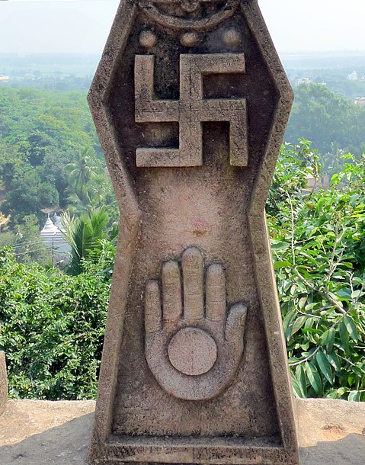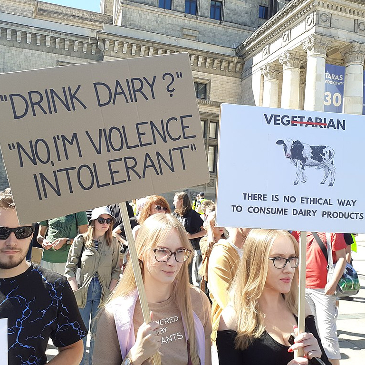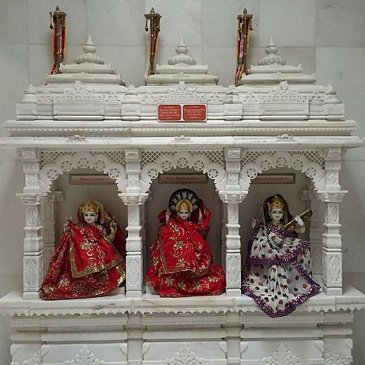Contrary to popular belief, veganism was not invented in the 1940’s in leafy Leicester. The principles behind our movement have their roots in the ancient Indian religions of Hinduism and Jainism. The question “Why do Jains not eat meat?” leads us to the concept of Ahimsa, or non-violence, which is integral and said to be as old as humanity itself.
Why Do Jains Not Eat Meat?
Jains do not eat meat because they adhere to the primary guiding principle of Ahimsa. This is to practise non-violence in all they do, physically and mentally. So killing animals for food is, unquestionably, off the menu. Many aspects of the Jain religion can teach us much about what it is to be vegan today in the 21st Century.
Watch: The Holy Jain Thali – Mahavir Sthanakvasi Jain Upashray – The Holy Kitchens Of India
( a brief but wonderful 4 minute window into the Jain way of life! )
What Is Liberation In Jainism?
Devotees of Jainism believe the soul is locked in an endless cycle of rebirth, or saṃsāra. Liberation is achieved when this cycle is broken, through enlightenment.

Liberation, or emancipation, can only be achieved when the soul is free of all karma and it is only the human animal which is able to realise this emancipation (mokṣa).
So Jains must conduct themselves appropriately within the faith and strive to gain the knowledge needed to attain enlightenment.
In fact these three elements of Jainism (conduct, faith and knowledge) are central to the religion and in order to acquire these qualities there are five great vows, or maha-vratas which must be observed:
- Ahimsa (non-violence)
- Satya (truth)
- Achaurya or Asteya (non-stealing)
- Brahmacharya (celibacy/chastity)
- Aparigraha (non-attachment/non-possession)
Ahimsa: The Head Cornerstone Of Jainism
The concept of non-violence, or Ahimsa is the most important principle for followers of the Jain faith. It applies to everything we do in life.
 Not limited to the physical aspect of our existence, Ahimsa must also be observed when we speak to others and even just think about our fellow Earthlings.
Not limited to the physical aspect of our existence, Ahimsa must also be observed when we speak to others and even just think about our fellow Earthlings.
… and by ‘Earthlings’ I mean all life we share this beautiful planet with, including animals, insects and even plants.
A quote often repeated in Jain religious texts is that of Mahavira, the 24th supreme preacher of Jainism. He is said to have achieved liberation in the 6th century BCE. His quote is as follows:
“Do not injure, abuse, oppress, enslave, insult, torment, torture, or kill any creature or living being.”
We can instantly see how the concept of Ahimsa has a lot of crossover with modern veganism. Indeed, today in the 21st century there are many Jains who have recognised the inherent cruelty of the dairy industry, deciding to reject milk products as well.
Related article: Are There Any Cultures That Are Vegan?
They have made the connection between their faith and modern day factory farming methods which enslave, abuse and torture billions of sentient animals as a matter of course.
It Means Non-Violence Towards Animals
 Veganism’s core principle surrounds the rejection of animal products in order to eliminate the individual’s generation of demand for such goods.
Veganism’s core principle surrounds the rejection of animal products in order to eliminate the individual’s generation of demand for such goods.
By removing that demand, we are ensuring our actions are not responsible for driving the economic machinery which results in the exploitation of billions of animals … make no mistake, the demand is currently off the scale!
So, as we can see, the concept of Ahimsa sits very well with vegans and provides us with a framework for and validation of our moral compass.
Backed up by thousands of years of ancient wisdom, we can be safe in the knowledge that our views are no new thing. We just have a new word with which we can identify the members of our movement.
All Living Beings Exist As Equals
Ahimsa teaches us that every single living thing on this planet is equal, irrespective of where they sit on the evolutionary and spiritual ladder.
 A human being has no more right to exist than the ant crawling across your front door step. It is therefore forbidden to kill or injure any other living being and this even extends to plants.
A human being has no more right to exist than the ant crawling across your front door step. It is therefore forbidden to kill or injure any other living being and this even extends to plants.
Many vegans speak of the concept of ‘Speciesism’, the idea that we humans consider ourselves superior to other animals – the ‘apex predator’ if you will.
Again, this is not a new thing. Thousands of years ago, Jains recognised the very same failing in humans and Ahimsa has addressed the problem.
Through non-violence, Jains strive to live in perfect symbiosis with nature, achieving a harmony which the human species at large seems to have great trouble attaining.
Living by these principles, embracing universal love and compassion means we cannot turn a blind eye to the suffering of others.
It’s clear that veganism sits very comfortably within the concept of Ahimsa and we can learn a lot from the teachings of Jainism.
Just quickly, on the killing of plants thing, which would seem to be at odds with human survival in general. Jains have to recognise this is not a practical way to live, since we have to eat.
To this end, life is classified by the senses. Plants have just one sense as do the primary elements of fire, water, earth, air etc. Humans are blessed with all five senses.
When confronted with violence, the suffering is more intense as you work up the classification and so it is permitted to kill plants in order to survive.
Veganism: A Spiritual Awakening?
Now, I’m not a religious man but when I decided to go vegan it was pretty close to a spiritual experience for me. Many new vegans report similar feelings.
 I don’t know if it was due to the universal energy re-aligning around my soul or if it was purely a physiological reaction to finally expelling that animal protein from my body!
I don’t know if it was due to the universal energy re-aligning around my soul or if it was purely a physiological reaction to finally expelling that animal protein from my body!
Whatever it was, I truly felt like a veil had been lifted from my eyes. I could see the truth.
I can only liken it to an experience I had in my early twenties when me and my small group of friends had a brief foray into the world of LSD.
I’m not condoning the use of mind-altering substances (don’t do drugs kids!) but one night I did experience what I later learned was a kind of astral projection.
I felt like I was travelling through space and time itself and I was utterly at one with the entire universe. It’s very difficult to explain just how profound the feeling was. It was like I had attained some kind of universal knowledge!
Anyway, before this goes completely off-track, veganism was a form of spiritual awakening for me, without doubt.
Maybe it is due to breaking free of the karma associated with being responsible for the suffering of other animals. I’ll likely never know.
But what I do know is veganism is one way we can make a positive change in this world. It gives us hope of a compassionate future where we have evolved to a point of universal love.
I believe it is the destiny of the human race.
I hope this piece has helped answer your questions today and I welcome your feedback. Please leave your comments below (I always respond) and if you think others may benefit then please share using the socials.
If you want more, sign up to our new content alerts and we’ll email you when we post.
Thanks so much for reading … it means the world to me!
Rohan.
Image credit:
[1] – By Steve Browne & John Verkleir – Flickr: Swastika and Jain hand symbolizing the importance of Ahimsa, CC BY 2.0, via Wikimedia Commons – Source [2] – Tomasz Molina, CC BY-SA 4.0, via Wikimedia Commons – Source [3] – Goddess Laxmi, Padmavati, Saraswati. By Malaiya – Own work, CC BY-SA 4.0, Malaiya, via Wikimedia Commons
